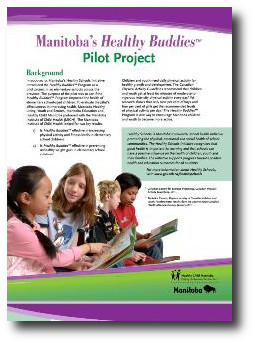 A new Manitoba study showed that peer mentoring in elementary school can have beneficial health effects for both mentors and mentees. The healthy living program, called Healthy Buddies, involved pairing students aged nine to 12 with children aged six to eight. The older students received 21 weekly lessons from teachers on healthy eating, positive self-esteem and physical activity, which they then passed on to the younger children. Key messages were, “Go Move!”, “Go Fuel!” and “Go Feel Good!” The study, based on a model developed by University of British Columbia researchers, took place in fall 2009. It involved 647 participants from 19 elementary schools. Students from 10 schools were randomly selected to receive the Healthy Buddies program and students from nine schools served as the control group. The study included rural schools and northern First Nations schools as well as students from a variety of socio-economic backgrounds. About 36% of the students were overweight or obese.
A new Manitoba study showed that peer mentoring in elementary school can have beneficial health effects for both mentors and mentees. The healthy living program, called Healthy Buddies, involved pairing students aged nine to 12 with children aged six to eight. The older students received 21 weekly lessons from teachers on healthy eating, positive self-esteem and physical activity, which they then passed on to the younger children. Key messages were, “Go Move!”, “Go Fuel!” and “Go Feel Good!” The study, based on a model developed by University of British Columbia researchers, took place in fall 2009. It involved 647 participants from 19 elementary schools. Students from 10 schools were randomly selected to receive the Healthy Buddies program and students from nine schools served as the control group. The study included rural schools and northern First Nations schools as well as students from a variety of socio-economic backgrounds. About 36% of the students were overweight or obese.
At the study’s conclusion, researchers found that the children who participated in the Healthy Buddies program showed improvements in self-esteem. Additionally, the younger children had lost, on average, about three quarters of an inch from their waists. The effect was larger for overweight and obese children as well as for First Nations children. The older children also showed a decrease in waist size, but the effect was smaller.
Researchers note that this study has important implications for promoting healthy weights and improving self-esteem amongst elementary school children. A high waist size is a major risk factor for type 2 diabetes and chronic diseases. Also, healthy students are less likely to be absent from class and more likely to have positive self-esteem and perform better in school. The study argues that the Healthy Buddies program is sustainable because it doesn’t involve a lot of the teachers’ time and can be easily incorporated into the curriculum.
The Healthy Buddies program facilitated social support amongst students, which has been shown to promote resiliency. Through social interaction, children learn to appropriately express and manage their emotions as well as to form rewarding relationships with their peers. Children naturally learn from their peers, so spreading healthy lifestyle messages through a buddy was effective. Additionally, the program helped older children develop leadership skills.
The success of the Healthy Buddies program in Manitoba provided additional evidence for its dissemination across the province. However, researchers noted it must be coupled with a healthy breakfast program and/or policy initiatives to increase the availability and affordability of nutritious food for all children.
Read the full Manitoba Health Buddies Pilot Project.